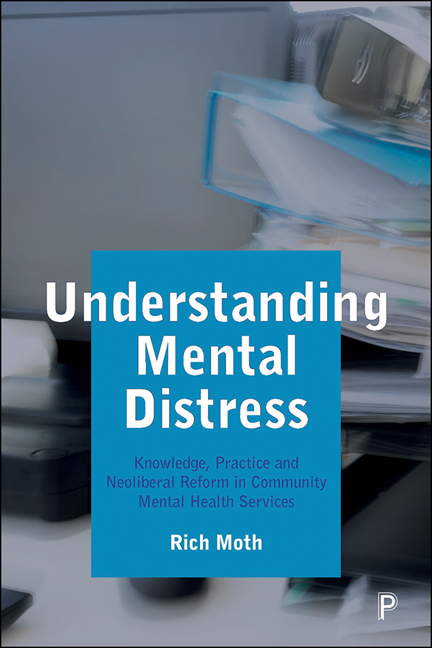 Understanding Mental Distress
Understanding Mental Distress Book contents
- Frontmatter
- Dedication
- Contents
- List of tables
- List of abbreviations
- Notes on the author
- Acknowledgements
- Introduction
- PART I Sociohistorical contexts of policy and practice
- PART II Lived experiences of neoliberal reform
- PART III Theorising knowledge and practice
- Conclusion
- Appendix: methodology
- Notes
- References
- Index
1 - Mental health services: from the asylum to neoliberal reform
Published online by Cambridge University Press: 08 October 2022
- Frontmatter
- Dedication
- Contents
- List of tables
- List of abbreviations
- Notes on the author
- Acknowledgements
- Introduction
- PART I Sociohistorical contexts of policy and practice
- PART II Lived experiences of neoliberal reform
- PART III Theorising knowledge and practice
- Conclusion
- Appendix: methodology
- Notes
- References
- Index
Summary
This chapter provides historical and policy context for the fieldwork chapters that follow. It begins by arguing that models of mental distress cannot be understood in isolation from the activities and action environments of which they form a part. Therefore, to develop a more contextually situated account of these forms of knowledge, the chapter proposes a sociohistorical framework for understanding key phases in the development of policies and systems of mental health provision. These four phases, or ‘conjunctural settlements’, begin with the 19th-century asylum, followed by the biomedical hospital system, then community care in the 20th century, and finally contemporary neoliberal provision. Prominent ways of understanding and responding to mental distress associated with each settlement are introduced.
The relationship between knowledge and practice
As the introductory chapter noted, mental distress is conceptualised in a number of different ways. This has found expression in the diverse range of explanatory frameworks utilised by mental health practitioners, service users, carers and others to understand and define such experiences. The practice of mental health workers tends to be oriented by professional training and disciplinary background and this is apparent in relation to understandings of mental distress (Coppock and Hopton, 2000). The explanatory frameworks drawn on by the various occupational groups, service users and others in this field are commonly conceptualised as articulations of professional ideologies and knowledge bases (Abbott and Wallace, 1990). These encompass a broad range of positions, from biomedical models of illness and psychopathology, through psychological and psychosocial orientations, to social perspectives informed by sociological theory and recovery models underpinned by conceptions of service user empowerment (Anthony, 1993; Tew, 2005, 2011; Read and Dillon, 2013; Davidson et al, 2016).
Often, accounts of models of mental distress/ illness within services and the academy abstract these forms of knowledge from the material conditions, historical processes and forms of agency through which they are produced, sustained or modified. This leads to an unsatisfactorily static and reified account of such concepts. Instead, I will argue that knowledge always arises from and is embedded in social practices and political contexts (Sayer, 1992). In order to apply this context-sensitive, sociopolitical and historical form of analysis to knowledge and practice within systems of mental health provision, I will propose a theoretical framework that combines Harris's (2008) notion of ‘conjunctural welfare settlements’ with Emergentist Marxism (EM) (Creaven, 2000).
- Type
- Chapter
- Information
- Understanding Mental DistressKnowledge, Practice and Neoliberal Reform in Community Mental Health Services, pp. 13 - 30Publisher: Bristol University PressPrint publication year: 2022


